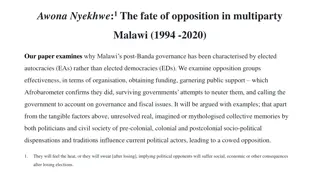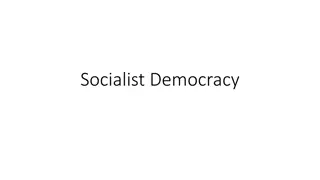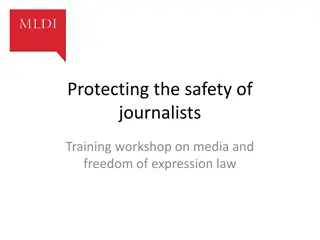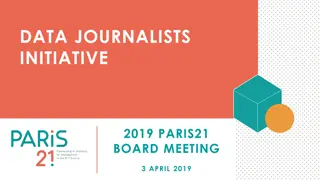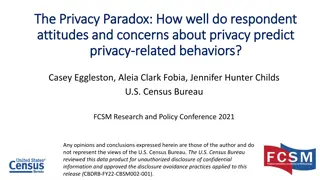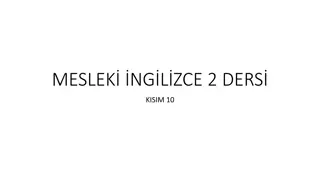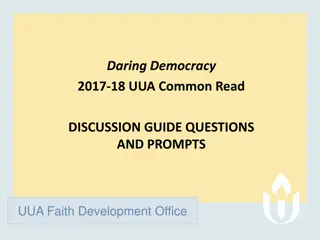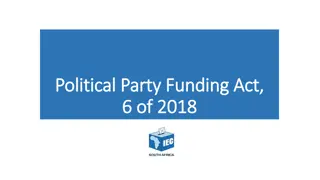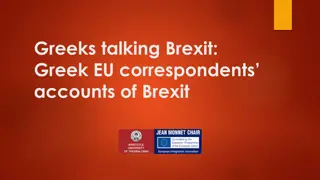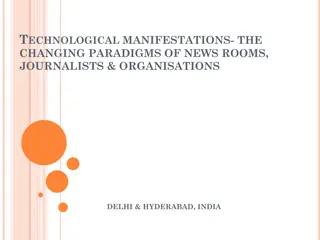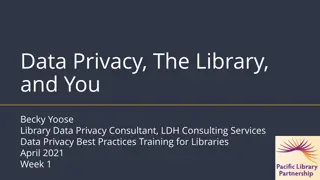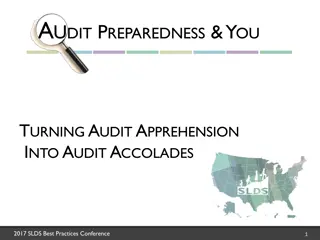Privacy and Democracy: Safeguarding Journalists and Political Opposition
Panel discussion on the importance of privacy as a structural safeguard for democracy, emphasizing protections against abuse of power by temporary leaders. Focus on special privacy measures for political opposition and journalists to uphold free speech and dissent. Historical context and future considerations for maintaining these safeguards are highlighted.
Download Presentation

Please find below an Image/Link to download the presentation.
The content on the website is provided AS IS for your information and personal use only. It may not be sold, licensed, or shared on other websites without obtaining consent from the author. Download presentation by click this link. If you encounter any issues during the download, it is possible that the publisher has removed the file from their server.
E N D
Presentation Transcript
Privacy and Democracy: Protecting Journalists & the Political Opposition from Abuse of Power Peter Swire Professor, Georgia Institute of Technology Research Director, Cross-Border Data Forum Venice Privacy Symposium June 10, 2024
Overview Our panel today on Privacy and Democracy Many discussions of privacy as an individual right My focus privacy also as a structural safeguard of democracy Checks and balances against abuse by temporary leaders of a democracy Reduce risk of slide from democracy to authoritarianism To do this, consider Special privacy protections against surveillance on the political opposition Also, for journalists, to ensure free speech and potential for dissent Also, Freedom of Information, to reduce secrecy of the temporarily-elected leaders Historically, we have seen such protections in wake of scandals Going forward, we should be alert to the importance of continuing to build these structural protections, often tailored to the particular democracy
Swire background Currently Professor of Law & Ethics at Georgia Tech, Atlanta Georgia USA Research Director, Cross-Border Data Forum Previously Trained in law and political philosophy Chief Counselor for Privacy, U.S. Office of Management & Budget (1999-2001) Member, President s NSA Review Group, after Snowden Liberty and Security in a Changing World (2013)
Westin Privacy and Freedom (1968) The modern totalitarian state relies on secrecy for the regime, but high surveillance and disclosure for all other groups. With their demand for a. complete commitment of loyalties to the regime, the literature of both fascism and communism traditionally attacks the idea of privacy as immoral, antisocial and part of the cult of individualism . This attitude is most strongly expressed in the consolidation phase of a new totalitarian regime. Autonomous units are denied privacy, traditional confidential relationships are destroyed, surveillance systems and informers are widely installed, and thorough dossiers are compiled on millions of citizens. A balance that ensures strong citadels of individual and group privacy and limits both disclosure and surveillance is a prerequisite for liberal democratic societies.
Recognizing the Risks US Supreme Court in Keith (1972): History abundantly documents the tendency of Government however benevolent and benign its motive to view with suspicion those who most fervently dispute its policies. Fourth Amendment protections become the more necessary when the targets of official surveillance may be those suspected of unorthodoxy in their political beliefs After Snowden, NSA Review Group said FISA s stricter limits on domestic surveillance express: not only a respect for individual privacy, but also and fundamentally a deep concern about potential government abuse within our own political system. The special protections for United States persons must therefore be understood as a crucial safeguard of democratic accountability and effective self-governance within the American political system.
History of Surveillance of the Political Opposition Watergate the criminal break-in (1972) was to the headquarters of the opposition Democratic Party U.S. Privacy Act of 1974 Privacy limits on the government Freedom of Speech: no surveillance based solely on First Amendment activity Freedom of Information Act expanded (1974) SAFARI scandal in France, revealed 1974 Deputy Director of the DGSE said reforms responded to a reputation once tainted by experiences of illegal surveillance of politicians ; also journalists CNIL legislation enacted 1978, for privacy, free expression, and other civil liberties
Pegasus Spyware Scandal Greece, Spain, others Surveillance of opposition political leaders, journalists Response includes 2024 EU Media Freedom Act New standards to protect journalistic sources & confidential communications Spywareonly permitted for serious offenses and judicial or independents and impartial decision-making authority
Swire Previous Paper on Restricting Surveillance of the Political Opposition 2019: The Important, Justifiable, And Constrained Role Of Nationality In Foreign Intelligence Surveillance The paper s claim: it can be lawful and normatively defensible to create stricter surveillance protections for a country s citizens Key rationale protect against slide from democracy to authoritarianiam Especially apparent for state of war or near-war Broader surveillance of adversary than of citizens
Recent and Other History of Surveillance against Domestic Political Opposition Clear history of such surveillance under Hitler, Stalin, Stasi that is the key role of the secret police, to detect political opposition Recent history of slide toward authoritarianism: Turkey: Growth in domestic surveillance over time. After failed coup, broad new powers for domestic surveillance. Mass jailings of political opponents, and limits on free press. Russia: intimidation and reported murders of political opponents and journalists. Venezuala: Under Maduro, domestic intelligence services targeted and jail the political opposition and journalists. China and crackdown on political opposition in Hong Kong, including pervasive facial recognition surveillance
Whether the Extra-Strict Rules Should Apply Globally One possible response is to agree that very strict rules should apply against domestic political surveillance, and then support the same very strict rules as applied to non-residents? My view super-strict (or equal rules) won t work for foreign enemies and non-domestic more generally War zone and foreign affairs illustrate the national security need for broader surveillance in foreign settings If tried to impose super-strict across the board, then the super-strict rules for journalists and political opposition would get eroded
A Recent Case Study: FISA Surveillance Reform 2024 Political controversy when FBI surveilled Trump advisors in 2016, with close ties to Russia My view there was a factual basis for investigating ties between that campaign and Russia Independent investigation concluded no political motivation or interference, although bad FBI procedures 2024 FISA reform (properly) addressed these concerns, so new rules Require prior approval of Deputy Director of the FBI for queries involving sensitive matters such as involving a U.S. elected official, prominent political organizations, or media organizations Require FBI to notify Congressional leadership, and that Member, if a query term uses information related to a Member of Congress
Conclusion (1 of 2): Privacy Protects Democracy For privacy & democracy, privacy rules play structural role to reduce risk of slide to authoritarianism Privacy as a set of checks & balances, and not only need individual rights to privacy Westin: The functions of privacy in liberal systems do not require that it be an absolute right -- Thus, the constant search in democracies must be for the proper boundary line in each specific situation and for an overall equilibrium that serves to strengthen democratic institutions and processes.
Conclusion (2 of 2): Especially Strict Surveillance Protections to Safeguard Democracy Consider having extra-strict protections against surveillance of journalists and political opposition The goal of preserving democracy can justify different, and stricter, protections for a country s own persons, to reduce the risk of slide to authoritarianism Recent online symposium How Does Digital Privacy Matter for Democracy and Its Advocates Elizabeth Donkervoort emphasized importance of privacy rules to protect democracy in global majority countries where democracy can be at risk Moreover, the global technology discourse that shapes privacy standards often fails to resonate in global majority countries due to its Eurocentric bent a predictable outcome given the underrepresentation of these countries at forums, like the UK s recent AI Safety Summit, where these issues are discussed. This disconnect, in turn, yields an opening in these underrepresented societies for oppressive or autocratic regulatory models such as those promoted by China. In conclusion, we should have caution about whether the same surveillance rules for all persons will best protect the political opposition, journalists, and the future of democracy Keep open to the possibility of extra-strong protections where those help maintain democracy





